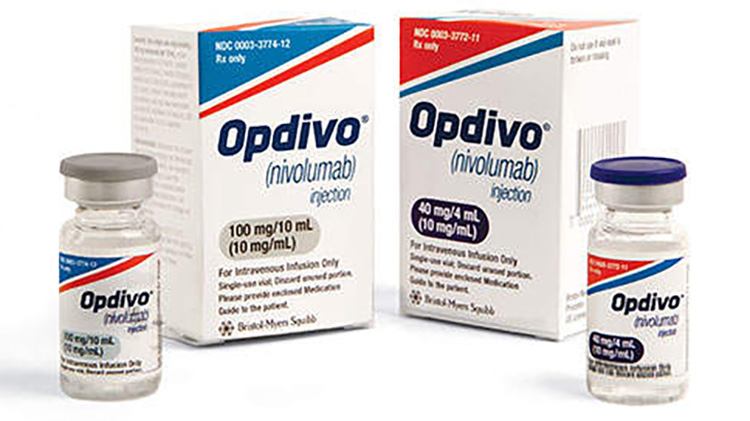Opdivo (Nivolumab) vs Xeloda ()
Opdivo (Nivolumab) vs Xeloda ()
Opdivo (nivolumab) is an immunotherapy drug that works by blocking the PD-1 pathway, which enhances the body's immune response against cancer cells, and is commonly used for various types of cancers including melanoma, lung cancer, and kidney cancer. Xeloda (capecitabine) is a chemotherapy medication that is converted into 5-fluorouracil (5-FU) in the body, which interferes with DNA production and kills rapidly dividing cancer cells; it is often used for treating breast and colorectal cancers. The choice between Opdivo and Xeloda would depend on the specific type of cancer, its stage, the patient's overall health, and previous treatments, as these medications have different mechanisms of action and side effect profiles.
Difference between Opdivo and Xeloda
| Metric | Opdivo (Nivolumab) | Xeloda () |
|---|---|---|
| Generic name | Nivolumab | Capecitabine |
| Indications | Various types of cancers including melanoma, lung cancer, kidney cancer, bladder cancer, head and neck cancers, and others. | Metastatic colorectal cancer, metastatic breast cancer, and adjuvant treatment of colon cancer. |
| Mechanism of action | Programmed death receptor-1 (PD-1) blocking antibody, which helps the immune system attack cancer cells. | Prodrug that is enzymatically converted to 5-fluorouracil (5-FU) in the body, which is a cytotoxic agent that interferes with DNA synthesis. |
| Brand names | Opdivo | Xeloda |
| Administrative route | Intravenous infusion | Oral |
| Side effects | Fatigue, rash, musculoskeletal pain, pruritus, diarrhea, nausea, and others. | Hand-foot syndrome, diarrhea, nausea, vomiting, fatigue, and others. |
| Contraindications | Known hypersensitivity to nivolumab or any of its excipients. | Known hypersensitivity to capecitabine or any of its components, and in patients with severe renal impairment. |
| Drug class | Immune checkpoint inhibitor, monoclonal antibody | Antimetabolite, fluoropyrimidine |
| Manufacturer | Bristol-Myers Squibb | Roche |
Efficacy
Overview of Opdivo (Nivolumab) in Colorectal Cancer Treatment
Opdivo, known generically as Nivolumab, is a type of immunotherapy that has shown efficacy in the treatment of certain types of colorectal cancer. It is a programmed death-1 (PD-1) immune checkpoint inhibitor that works by blocking the PD-1 pathway, thereby enhancing the immune system's ability to detect and fight cancer cells. Opdivo has been particularly effective in colorectal cancer patients with high microsatellite instability (MSI-H) or mismatch repair deficiency (dMMR), conditions that affect the DNA repair process within cells and are present in a subset of colorectal cancers.
Efficacy of Opdivo in MSI-H/dMMR Colorectal Cancer
Studies have demonstrated that patients with MSI-H/dMMR metastatic colorectal cancer who have been treated with Opdivo show a significant improvement in overall response rate (ORR) and progression-free survival (PFS) compared to conventional chemotherapies. The efficacy of Opdivo in this patient population is noteworthy because these patients historically have a poor prognosis and limited treatment options. The use of Opdivo for MSI-H/dMMR colorectal cancer represents a shift towards personalized medicine, where the treatment is tailored based on specific genetic features of the cancer.
Xeloda (Capecitabine) in Colorectal Cancer Management
Xeloda, or Capecitabine, is an oral chemotherapy medication that is converted into 5-fluorouracil (5-FU) in the body, which then interferes with the DNA synthesis of cancer cells, leading to cell death. Xeloda is commonly used in the treatment of colorectal cancer, both in the adjuvant setting (after surgery to remove the primary tumor) and in metastatic cases. It has been shown to be effective as a single agent and in combination with other drugs, and its oral administration makes it a convenient option for patients.
Combination Therapy with Opdivo and Xeloda in Colorectal Cancer
There is growing interest in exploring the efficacy of combination therapies involving both immunotherapy agents like Opdivo and traditional chemotherapies like Xeloda. While the combination of these two drugs is not a standard treatment for colorectal cancer, clinical trials are underway to determine the potential benefits of such regimens. The rationale behind combining immunotherapy with chemotherapy is to potentially enhance the immune response against cancer cells while directly targeting them with cytotoxic agents. However, the efficacy and safety of such combinations need to be established through rigorous clinical trials before they can be recommended as a standard treatment approach for colorectal cancer.
Regulatory Agency Approvals
Opdivo
-
European Medical Agency (EMA), European Union

-
Food and Drug Administration (FDA), USA

-
Health Canada

-
Pharmaceuticals and Medical Devices Agency (PMDA), Japan

-
Therapeutic Goods Administration (TGA), Australia

-
Medsafe (NZ)

Xeloda
-
European Medical Agency (EMA), European Union

-
Food and Drug Administration (FDA), USA

Access Opdivo or Xeloda today
If Opdivo or Xeloda are not approved or available in your country (e.g. due to supply issues), you can access them via Everyone.org.
How it works

Make an enquiry
Choose the medicine you want to buy, answer a couple of questions, and upload your prescription to speed things up. We’ll get back to you within 24 hours.


Make an enquiry
Choose the medicine you want to buy, answer a couple of questions, and upload your prescription to speed things up. We’ll get back to you within 24 hours.


Breeze through the paperwork
We'll guide you through the required documents for importing unapproved medicine, ensuring you have all the necessary information.


Get a personalized quote
We’ll prepare a quote for you, including medicine costs and any shipping, administrative, or import fees that may apply.


Receive your medicine
Accept the quote and we’ll handle the rest - sourcing and safely delivering your medicine.

Some text on this page has been automatically generated. Speak to your physician before you start a new treatment or medication.
Let's talk
If you have any questions, call us or send us a message through WhatsApp or email:
Contact us




